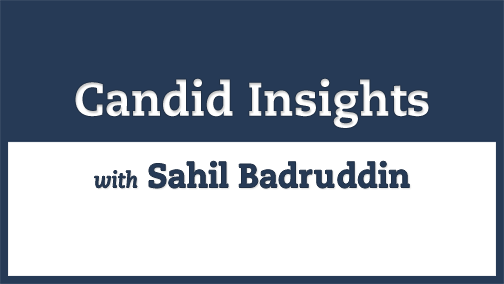Shama Hyder on the Age of Digital Marketing and Social Media
EDITORS’ NOTE: Shama Hyder — CEO of Zen Media, a global marketing and new media communications firm and listed by Forbes and Inc Magazine as a 30 under 30 Entrepreneur — discusses her insights on her journey in digital marketing, guidance for early entrepreneurs, the dangers of excessive social media for teens, and forming good relationships, and her advice for South Asian youth.
Interview Questions
Inspiration and Impact — Time Index: 0:49 (Based on the Audio)
1. Let’s talk about your story. You wrote your graduate thesis on Twitter when it had about 2000 users. It was the early days of social media and digital marketing and there were no jobs in the industry, as you say. So you started your own company, Zen Media, and then eventually wrote a whole book on the Zen of Social Media marketing, which is now used by college campuses and universities around the world. I want to talk about your inspiration behind your work, and what kind of impact you want to make.
Implementing Lessons into Everyday Life — Time Index: 4:54
2. I want to talk about the lessons you’ve shared with others that you would give to them in their 20s. So you’ve told them to think bigger. Be more assertive, think bigger. You’ve said that it’s only lonely at the top, if it’s lonely at the bottom, if you are good at building your relationships and maintaining relationships and keeping them, then it won’t really be lonely at the top. Fear is a killer, and really getting past what people think about you. And realizing when to take action and not to take action. The fourth thing you said is that real confidence is not faking it till you make it, it’s actually something you earn over time, something I almost call about earning your own self-respect, and kind of practicing and overcoming these obstacles and challenges is one way that you build that. And the fifth thing you said is, just because, and this goes back to relationships, again, is just because you understand what’s wrong with something doesn’t mean the opposite of that is right. And to kind of manage those relationships, effectively.
My question here is really, within the framework of thinking about these different things, how do you how can you actively implement them, you know, consciously, in your day-to-day lives? In the micro-interactions almost that you mentioned?
Overcoming Self Doubt — Time Index: 8:56
3. I always believe that money or fame, or any of these things don’t really, they build character, I think, but and they reveal kind of who you are, in some sense, too. And so I think it’s that process that you mentioned, and what kind of person you become from those things from fame, or for money or from anything, right? That’s what defines you. The second thing I would say is, if I kind of look at the five things that we’ve talked about, the underlying thing I almost see is self-doubt, right? How do you really get past self-doubt? But thinking bigger about building your relationships is other tips you found, whether it be keynote speaking, or anything to get past that self-doubt? Because you speak a lot about betting on yourself and the right mindset and the right framework of thinking.
Innovation — Time Index: 12:24
4. I think having the right people who build your confidence and are there to inspire potential, that’s a very practical way of kind of thinking about how to break out of some of these fears and nervousness, etc.
I want to talk about innovation. I think one of the things you mentioned is that during a crisis is that you see a lot of innovation happening. And I’m always of the belief that you should continuously be out-innovating yourself because if you’re not, someone else is really doing it. What other criteria or tips do you have on having a mindset of innovation that people often miss?
Imposter Syndrome — Time Index: 15:30
5. Did you ever feel that as you were going through your journey, did you feel the imposter syndrome? After getting opportunities, did you feel perhaps you weren’t skilled enough or talented enough? And then how did you overcome them? And what advice would you give to others to overcome them?
Reflection and Moving Forward — Time Index: 18:38
6. Because I often say that, like when we’re in the moment, I don’t think anybody purposely says, I am going to do this the wrong way, or I’m going to make this mistake But I guess suppose you’re giving a keynote, and you come out of it and said, maybe I should have said this differently. How do you just not sweat the small stuff and keep moving forward? How do you deal with moments where, you know, you should have done things differently?
Grieving Process — Time Index: 21:04
7. So in those moments, where you’ve had major personal losses, maybe perhaps when you had your first one, how did you get through it? I think everyone has to go through the grieving process; everyone has to go through those things. What advice would you give to your former self?
Children and Social Media — Time Index: 27:03
8. I want to shift our conversation to social media. This is something I don’t know if you’ve spoken about but I would love to hear some of the negative aspects of social media and what it does to human psychology. So Sean Parker, the Founding President of Facebook, said all social media companies consciously “exploited a vulnerability in human psychology”. He has also said, “God only knows what it’s doing to our children’s brains.”
And you often see that top silicon tech executives like Bill Gates or others actually kept smartphones and other things away from their children until they were teenagers. How do you think we balance that social media can be addictive but can have a negative impact on our brains, and especially on child psychology to using the tool as a positive? Because it’s a tool, right? It’s how you use it. And like anything else, it’s how you use it that makes a difference.
Advice to South Asian and Muslim Community — Time Index: 32:20
9. I believe there are young people in the South Asian and Muslim community who look up to you as a role model. Do you have a message to share with them?
About Shama Hyder
Shama Hyder is a visionary strategist for the digital age, a web and TV personality, a bestselling author, and the award-winning CEO of Zen Media – a global marketing and digital PR firm. She has been named the “Zen Master of Marketing” by Entrepreneur Magazine and the “Millennial Master of the Universe” by FastCompany.com. Shama has also been honored at both the White House and The United Nations as one of the top 100 young entrepreneurs in the country.
Shama is the bestselling author of The Zen of Social Media Marketing, now in its 4th edition and Momentum: How to Propel Your Marketing and Transform Your Brand in the Digital Age. An acclaimed keynote speaker, Shama has delivered keynotes in over 20 countries and spoken for recognized brands including Movado, Chase, Tupperware and Inc 5000.
As a result of her success, Shama has been the recipient of numerous awards, including the prestigious Technology Titan Emerging Company CEO award. She was named one of the “Top 25 Entrepreneurs under 25” by Business Week in 2009, one of the “Top 30 Under 30” Entrepreneurs in America in 2014 by Inc. Magazine, and to the Forbes “30 Under 30” list of movers and shakers for 2015. LinkedIn has named Hyder one of their “Top Voices” in Marketing & Social Media for three years in a row. Her online videos were awarded the “Hermes Gold award for Educational Programming in Electronic Media” and most recently she was given the “Global Empowerment award for Marketing and Technology” by Anokhi Media.
As the CEO of Zen Media, she and her team help both B2B and B2C brands to make meaningful connections with the modern-day customer via influencer marketing, experiential and digital storytelling — and then turning those into bottom line results. Notable clients include Chase Business, The US Navy, DFW Airport, MaryKay, and Tupperware.


